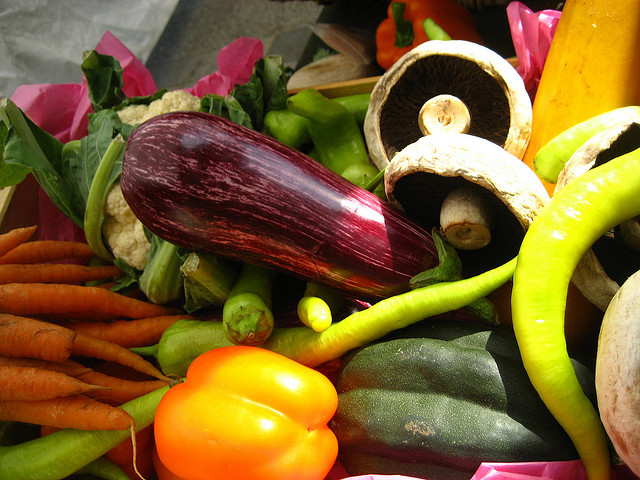Want more coverage of industrial farming, animal welfare and the environment? Support rabble.ca today!
Local food activist Ran Goel speaks to Steffanie Pinch about how eating local, organic and vegan can be better for the planet.
How much of an impact can one person’s diet have on the environment?
Your diet actually makes makes a huge difference depending on what your diet is composed of, whether it’s mostly plant-based or animal-based, whether it’s organically made and where it comes from geographically. You can see that in the comparative between how much meat the average Canadian eats, which is 170 lbs a year, versus a person in a developing country who eats a quarter of that or even much less. That has a huge impact on how many resources you use for food. So even if you set aside the animal welfare questions, even just for the environmental reasons, what you eat can make a big difference.
What are the environmental benefits of local food?
There are some typical examples. One of them is, all things being equal, it’s better to eat local because there’s less transport which means fewer greenhouse gas emissions, so you’re not trucking things from as far. But I think it goes far beyond that. When we eat local, we’re eating food made within our political realm. You have much more potential control over how that food is made, both in who is making it and also the impact it has on the environment.
If you’re in Toronto and you buy your food from a farm outside of London, you have much more control over knowing how it’s made. There’s more transparency, but ultimately you’re able to change how it’s made by lobbying for certain types of laws to be passed. It creates a consciousness around food, to be surrounded by places where food is made. If we outsourced all of our food making to other countries it would give us far less opportunities to meet farmers and to have control and to learn about our food.
What are the challenges of eating local?
The biggest challenges are two-fold. The first one is access. Most of our food retailers, 70 per cent or so, are controlled by three grocery conglomerates: Sobeys, Loblaws and Metro. They don’t place local food as a priority. Contrary to some of their advertising campaigns or the imagery they try to use in stores, the vast majority of their produce is not grown in and around Ontario or Canada for that matter.
The other issue is food preparation skills. In Canada, if you’re trying to do a local diet you’re a bit more limited over the winter. There’s just less variety available. That’s where food preparation skills come in even more. Canning, preserving and different ways of making food can help get you through a season. It’s about relearning some of those skills we’ve lost on the food preparation side.
What are the environmental benefits to eating organic?
Eating organic is important environmentally in many respects, the biggest of which is combatting the pesticides and herbicides they use in conventional agriculture. Many of them have very bad environmental impacts both on the soil, on the water and air as well. One of the defining characteristics of a pesticide is that it doesn’t just kill what you want it to kill. It kills a lot of other things. It doesn’t just do its job and disappear, it stays in the environment. Whether it is killing insects or other animals you didn’t mean to kill, whether it’s causing all sorts of hormonal issues in animals and humans alike, it has a huge impact on us. In many times and many cases, it’s an impact that’s unknown right now. Some of these symptoms take a long time to show up and some are cumulative. That’s one reason why it’s really important, those chemicals have long-term implications we don’t know about and short-term impacts we know we should avoid.
There’s also the issue of synthetic fertilizers. They are very energy intensive which is bad for climate change because it creates more greenhouse gas emissions to grow a certain unit of food. Organic farmers will rotate crops or use composted manure or nitrogen fixing crops like legumes instead of synthetic fertilizer. Synthetic fertilizer also has a lot of run off. It has impacts on water where you see entire “dead zones” in lakes and other bodies of water that have become bereft of any higher forms of life. There’s also the more recent phenomenon of genetically modified food which we also don’t know much about the long-term implications of.
How does a vegan diet compare to the environmental benefits of eating local or organic?
It’s hard to compare these diets in pieces. Veganism is definitely less resource intensive. Whether you’re eating dairy or meat it’s a very energy intensive way to eat because you’e growing an animal for years at a time. If you’re just measuring carbon dioxide emissions, I’d imagine veganism would win out. But you could eat a vegan diet made of plant-based products that are imported and not organic. It’s a difficult comparison and you have to look at all the factors involved, but I’d say from a resource energy perspective it would definitely be better for the environment.
Ran is an activist and founder of Fresh City. He believes city farming can change the world by re-introducing all of us to how real food is made. Some of his formative childhood experiences include his grandmother’s stories about growing up on a Kibbutz, feeling democracy awaken in South Africa where he grew up and his mom’s stuffed peppers. Before founding Fresh City, Ran practiced investment law in New York for several years. He holds a business degree from the Schulich School of Business, York University, a masters in political economy from the London School of Economics and a law degree from the University of Toronto.



